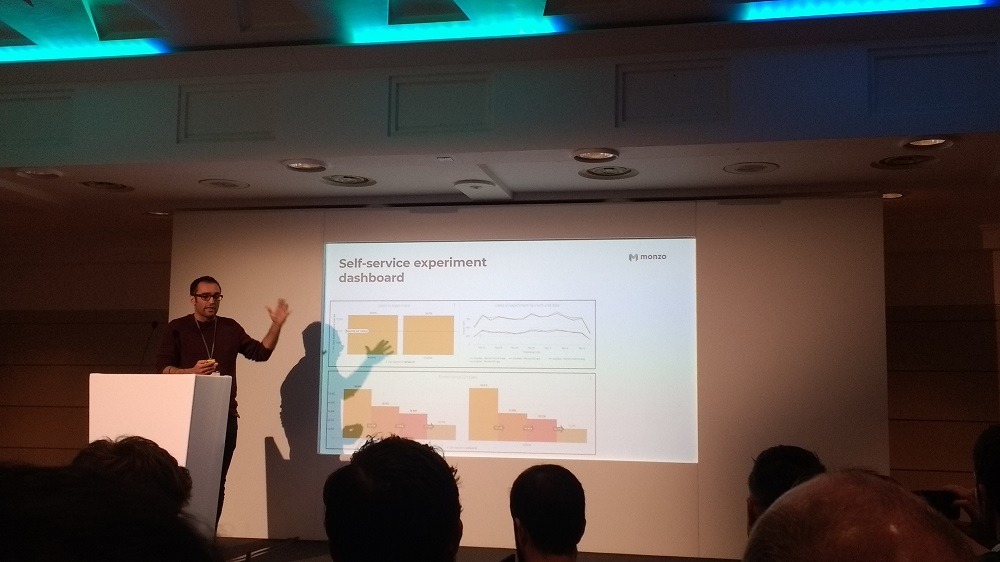Machine learning lead Neal Lathia spoke at the Looker JOIN event in London about how Monzo's data management is about enabling others in the business to make better decisions

Monzo's 'hot coral' contactless payment card (Credit: Monzo)
Monzo’s machine learning lead spoke at a conference this week about data management within the company’s internal structures. Andrew Fawthrop was in attendance
The popularity of digital banks has been gathering pace in recent years, as more and more people decide to test the water with digital finance tools provided by the likes of UK fintech heavyweights Starling, Revolut and Monzo.
But, as Revolut has recently discovered, rapid growth brings new challenges for start-ups as they increase in size, both in terms of headcount and product sophistication.
And for fintech companies like these, which rely so heavily upon data and technology, one of the biggest challenges comes in the form of efficient data management.
Monzo’s machine learning lead Neal Lathia spoke on this subject at the Looker JOIN event in London on Tuesday (9 April), giving his audience an insight into how his firm copes with vast and increasing amounts of data that flows through the Monzo ecosystem each day.
The Looker data management platform is utilised by Monzo analysts as part of their their day-to-day routines, and helps them to keep on top of an increasingly complex workflow.

“The thing we are trying to avoid is being responsive to the business – waiting for someone to come to us with a question in order to do something for them,” said Mr Lathia.
“We are a small team and we cannot be everywhere. A lot of our focus is on enabling the rest of Monzo to make great decisions quickly using the data that we have.”
Monzo’s rapid growth makes data management a growing challenge
With more than 1.7 million customers on its books, and 28,000 new accounts being opened each week, Monzo has undergone a significant growth spurt since it was founded in 2015.
It secured £85m in Series E funding last October, and rumours are circulating of a forthcoming £100m investment from US venture capital firm Y Combinator that would propel it to unicorn status.
Amid all this progress, the day-to-day reality for Monzo’s data team is more information to process and organise, new demands from the Monzo product, and a team now spanning several hundred employees in need of support in dealing with the vast digital records being created.
Monzo data management is a matter of making better decisions faster
For Mr Lathia, a key role for his 20-strong team of data analysts is to enable the wider Monzo team to understand information better and to use it more efficiently.
The data team tries to strike a balance between having a centralised and decentralised model, aiming to benefit from the rewards offered by each approach.
It shares knowledge, carries out peer reviews and monitors career development as a single unit, but on a day-to-day basis each individual member of the group is embedded into a separate product team, so they are available throughout the business.
The culture fostered within the Monzo data team is very important according to Mr Lathia, who emphasised the importance of certain core values – having a “mini-CEO mindset” to maximise impact, encouraging others to use data to make decisions, and being a “force multiplier”.
The idea of being a force multiplier is a big part of how the Monzo data team looks to make the data management process more efficient across the business.
Mr Lathia said: “One of the key differences I noticed when joining Monzo was changing the mindset away from writing queries to answer a question you receive, and moving towards writing queries to create data models that enable answering many different types of question.

“One of the key benefits of this is that it acts as a force multiplier – trying to put our code together in a way that every time an analyst does one piece of work, the next analyst won’t have to do it again.
“About 90% of the questions we get in the data team revolve around: ‘How has something changed recently?’ – from how many new customers we have gained, to how many people contacted customer service.
“In a classical business intelligence set-up, we would receive these questions, do a piece of work, and send the answer back.
“But this leads to the business intelligence team becoming the bottleneck for answers.”
Monzo data management includes a single database to make answering questions easier
To avoid this scenario causing an internal backlog, and the data team becoming overwhelmed by the sheer volume of individual requests, Monzo’s approach has been to create a single “user stats” database where information is layered to create a fuller picture that can be accessed by anyone within the company.
Mr Lathia added: “Every time a new question comes up about how things are changing over time, the analyst doesn’t have to start from raw data to compute an answer.
“Instead, they can add a new column to our user stats data model – which is one row per customer, per day they’ve been with Monzo.
“This means that when new events happen, the task becomes to add new data into the user stats database, which allows anyone to access that data and compare it to anything else that has been added to it in the past.
“This is something that I’ve only seen at Monzo so far.”
